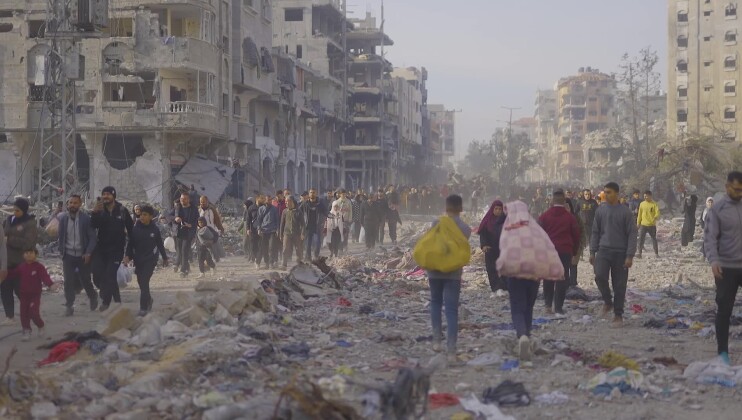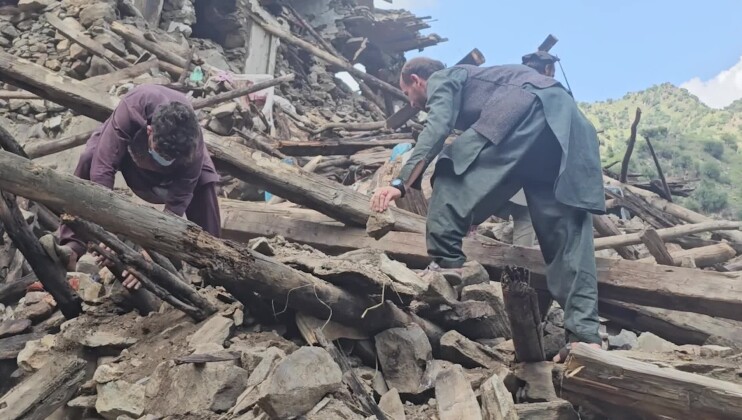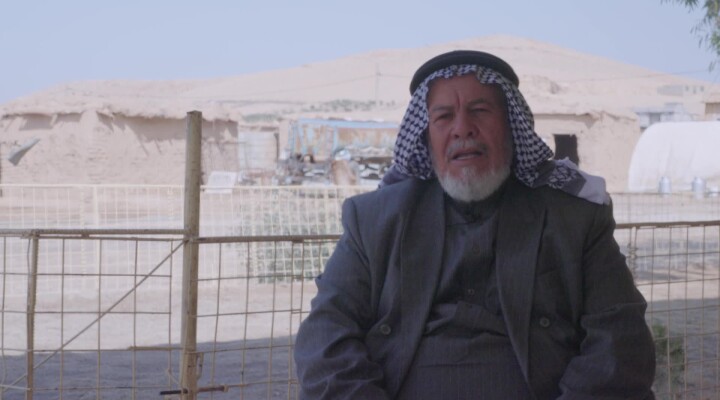Syrian refugees in Jordan in dire need of help
Story One; Newly arrived refugees in Eastern Jordan
Jordanian authorities have recently called on the international community for greater assistance to help the country cope with more than 500,000 Syrian refugees. The flow of newly arrived Syrians fleeing the conflict is not abating as hundreds try to cross the border into Jordan every day.
The traditional entry points in north-west Jordan are now harder to reach for the refugees due to the intensity of the fighting on the Syrian side. More and more families embark on a dangerous journey across Syria to reach the eastern border areas of Jordan in search of a safe haven. Between 200 and 500 people arrive every day in this remote desert area, where the Jordan Armed Forces gather refugees first in assembly points, then in transit sites.
Refugees can wait from 2 to 3 days in these desert locations before they are transported by bus to the Raba’a Al Sarhan Registration Facility. There they will be designated to either Al-Zaatari refugee camp or one of the other smaller camps established in Jordan to host Syrian refugees.
Since July 2013, the International Committee of the Red Cross (ICRC) have equipped three assembly points and two transit sites in the Ruwaishid area with water supply, sanitation facilities and waste containers in order to ensure immediate access to essential services, including temporary accommodation. ICRC trucks regularly deliver blankets, jerry cans and hygiene items while a local NGO distributes meals paid for by the ICRC twice a day.
More trained to guard the borders in the desert than to cope with the humanitarian consequences of the Syrian conflict, the military of the Royal Border Guard Battalion No.6 have to deal with exhausted and frightened people. Refugees, including the elderly and the very young have walked long distances mostly at night to cross the border.
Abdel-Rahmane arrived in Bustana assembly point at the beginning of November. He describes his journey through the eastern part of Syria: “It took around 3 days. We were dying of hunger and thirst to the point that we had to give bits of dry bread to the children so that they could eat and walk.”
This father of six from Homs has been roaming for two years with his family inside Syria in search of a safe haven, but to no avail. So he recently decided to escape from his country using the desert route to flee fighting and destruction. Abdel-Rahmane sees a bleak future for his children: “All these children will be brought up in ignorance. No education, no school, nothing, the future is lost. God knows what will happen.”
The ICRC is the only international organization operating in this region.
Story Two; Settled refugess near Magraq receive cash for survival
The majority of Syrian refugees are residing in host communities across Jordan, having left all their belongings behind. Due to limited income and the high cost of living, most of them cannot meet basic needs such as food, health care, house rent, water and electricity bills.
In order to support Syrian families living in host communities in Mafraq Governorate, the ICRC together with the Jordan Red Crescent Society has started distributing debit cards to 1000 vulnerable families.
As ICRC’s Hekmat Sharabi, puts it, this cash transfer programme “is much more flexible than just giving them for example any kind of assistance that they might not perceived as good for them."
Lama, a widow in her thirties, fled Syria at the beginning of 2013 with her 9-year-old daughter to rejoin 10 other family members in a three-room house close to the Al Zaatari refugee camp. The cash she receives on behalf of her family (300 USD in November) has dramatically helped improve their diet as they can now buy fruit and vegetables.
But Lama and her brother are bitter and homesick: “Imagine that you‘re living safely in your country and then you end up here… We feel so humiliated. It‘s very hard to be a refugee” she says.
The children in the household are deeply traumatized. Says Khaled, Lama’s brother: “Some days there are fireworks here and the children get scared. They think it‘s the sound of bombing although it‘s just fireworks. But they think we‘re being bombed so they run and hide shouting Allahu Akbar.”
The will to go back to Syria is strong although they have little or nothing to return to. As soon as the security situation is safe enough for them to return, they will leave Jordan immediately, “no matter how long we live here and no matter how kind the people are, no country will embrace us like our own homeland,” concludes Khaled.
The mechanism for the cash transfer is done through ATM cards issued by a major bank. The project will last until March 2014, with one instalment per month. The amount of cash assistance varies according to the household size. To help Syrians withstand winter, the amount will increase during the cold season.
Shotlist
Location: Ruwaishid area and Mafraq town
Length: 9:32
Format: Mpeg4/16:9/HD/SD
Production: Didier Revol/Hala Shamlawi
Sound: English/Arabic
ICRC ref: AV0122N
Date: November 2013
Copyright: ICRC access all
00 00 Two ICRC trucks in Jordanian desert heading to Bustana assembly point (Ruwaishid area) to deliver essentials items to newly arrived Syrian refugees (3 shots)
00 19 ICRC trucks entering assembly point
00 23 Board hanging on main gate with “Royal Border Guard Battalion No.6”
00 27 Large view of main gate
00 32 Refugees with luggage (2 shots)
00 43 Refugees waiting for truck to unload blankets and mattresses
00 48 Refugees in front of prefab dwellings provided by ICRC
00 57 ICRC staff opening rear doors of truck in front of refugees (2 shots)
01 11 Group of kids and women
01 16 People queuing for food distribution (2 shots - meals paid by ICRC and provided by local NGO).
01 30 Abdel-Rahmane gets meal for himself and his mother
01 38 Cutaway of refugees in front of prefabs
01 44 Abdel-Rahmane enters his prefab to join the rest of his relatives
01 52 Inside prefab with Abdel-Rahmane’s family
01 58 Close shot of Abdel-Rahmane’s mother
02 02 Close shot on kid playing with egg
02 07 ITW Abdel-Rahmane (Arabic – 19”)
“There was no mercy, no mercy and no empathy whatsoever. Just monstrous brutality, destruction, displacement, strikes, bombings. We had no shelter, no food, no water, nothing at all. That’s why we were forced to leave.”
02 25 ITW Abdel-Rahmane (Arabic – 15”)
“The trip took around 3 days. We were dying of hunger and thirst to the point that we had to give bits of dry bread to the children so that they could eat and walk.”
02 40 ITW Abdel-Rahmane (Arabic – 21”)
“The future looks bad in terms of teaching the children and sending them to school... All these children will be brought up in ignorance.”
02 54 “No education, no school, nothing, the future is lost. God knows what will happen.”
03 01 Large view of prefab and tent (pano)
03 12 Refugees before tent
03 17 Close shot on kid
03 22 Refugees, prefab and sunset
03 26 Close shot on kids
03 30 Sunset at border between Jordan and Syria (3 shots)
03 46 Large view of Mafraq stadium (Mafraq is a town close to Zaatari camp) where Syrian refugees gather to collect their monthly ATM cards
03 52 Crowd of refugees listening to ICRC staff
03 57 Lama walking towards improvised office inside stadium facilities to get her ATM card from Jordan Red Crescent and ICRC staff (4 shots)
04 06 Lama enters improvised office
04 13 Close up on Lama’s eyes
04 21 Close up on Jordan Red Crescent staff explaining to Lama how to use the ATM card
04 27 Close up on ATM card
04 33 Medium shot of Jordan Red Crescent and ICRC staff with Lama
04 41 ITW Hekmat Sharabi, ICRC Amman (English – 15“)
"The refugees themselves feel more comfortable, happier when we are dealing with them directly in regards giving them a certain amount of payment which they certainly need in these very very difficult circumstances."
04 55 ITW Hekmat Sharabi, ICRC Amman (English – 10“)
"It's much more flexible than just giving them for example any kind of assistance that they might not perceived as good for them."
05 05 Lama proceeding to ATM in Mafraq town
05 11 Lama getting cash from the machine and walking away (6 shots)
05 47 Lama entering grocery shop and proceeding to vegetable stalls
(2 shots)
06 12 ITW Lama (Arabic – 20”)
“Potato is a basic item at home, a must have as you know. And we consume it a lot. So, we took the ATM card today. I drew some money and came here to buy some vegetables for the kids.”
06 31 Lama paying cashier
06 41 Lama on her way home
06 51 Lama’s brother (Khaled) and nephew (Jafar) greeting Lama at the doorstep
07 00 Lama in kitchen
07 16 Lama sharing her meal with brother and nephew
07 27 ITW Lama (Arabic – 16”)
“It‘s a very bitter and difficult thing. Imagine that you‘re living safely in your country and then you end up here… We feel so humiliated. It‘s very hard to be a refugee.”
07 42 Meal (4 shots)
08 01 Syrian TV channel showing images of war
08 10 Close up on 3 faces (Lama, Khaled, Jafar)
08 24 ITW Khaled and Lama (Arabic – 20”)
“Some days there are fireworks here and the children get scared. (Khaled) They think it‘s the sound of bombing although it‘s just fireworks. But they think we‘re being bombed so they run and hide shouting Allahu Akbar.”
08 36 “Even if a plane passes over they think it will bomb us.” (Lama)
08 40 “Fear still has a firm grip on them.” (Khaled) “They’re still living those events.” (Lama)
08 45 Close up on Jafar
08 49 ITW Khaled and Lama (Arabic – 10”)
“One must return to their country at some point. No matter how long we live here and no matter how kind the people are. But no country will embrace us like our own homeland.”
08 59 Close up on hands
09 08 ITW Lama (Arabic – 11”)
“I miss my father so much. And all my brothers and my country. I miss them a lot.”
09 19 Lama cries
09 32 ENDS



